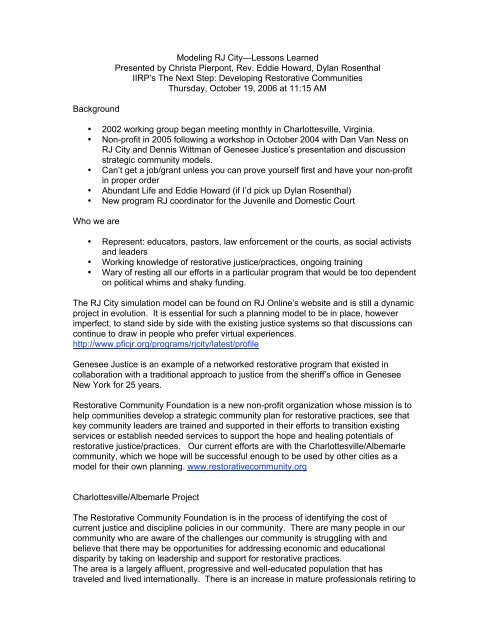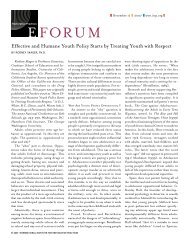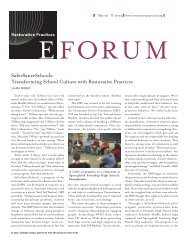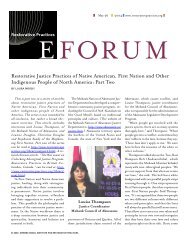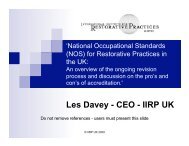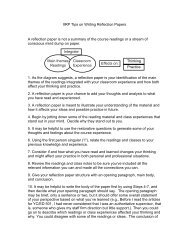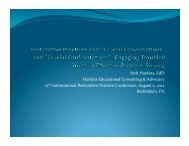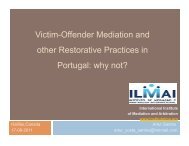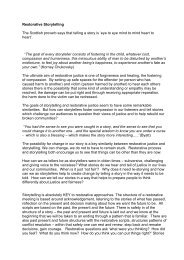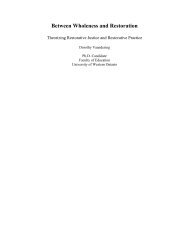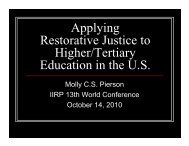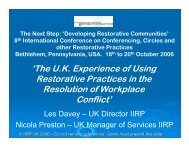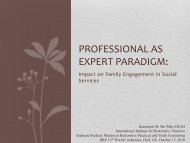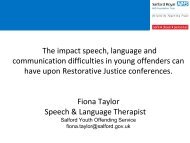Modeling RJ City SM : Lessons Learned - IIRP
Modeling RJ City SM : Lessons Learned - IIRP
Modeling RJ City SM : Lessons Learned - IIRP
Create successful ePaper yourself
Turn your PDF publications into a flip-book with our unique Google optimized e-Paper software.
Background<br />
<strong>Modeling</strong> <strong>RJ</strong> <strong>City</strong>—<strong>Lessons</strong> <strong>Learned</strong><br />
Presented by Christa Pierpont, Rev. Eddie Howard, Dylan Rosenthal<br />
<strong>IIRP</strong>’s The Next Step: Developing Restorative Communities<br />
Thursday, October 19, 2006 at 11:15 AM<br />
• 2002 working group began meeting monthly in Charlottesville, Virginia.<br />
• Non-profit in 2005 following a workshop in October 2004 with Dan Van Ness on<br />
<strong>RJ</strong> <strong>City</strong> and Dennis Wittman of Genesee Justice’s presentation and discussion<br />
strategic community models.<br />
• Can’t get a job/grant unless you can prove yourself first and have your non-profit<br />
in proper order<br />
• Abundant Life and Eddie Howard (if I’d pick up Dylan Rosenthal)<br />
• New program <strong>RJ</strong> coordinator for the Juvenile and Domestic Court<br />
Who we are<br />
• Represent: educators, pastors, law enforcement or the courts, as social activists<br />
and leaders<br />
• Working knowledge of restorative justice/practices, ongoing training<br />
• Wary of resting all our efforts in a particular program that would be too dependent<br />
on political whims and shaky funding.<br />
The <strong>RJ</strong> <strong>City</strong> simulation model can be found on <strong>RJ</strong> Online’s website and is still a dynamic<br />
project in evolution. It is essential for such a planning model to be in place, however<br />
imperfect, to stand side by side with the existing justice systems so that discussions can<br />
continue to draw in people who prefer virtual experiences.<br />
http://www.pficjr.org/programs/rjcity/latest/profile<br />
Genesee Justice is an example of a networked restorative program that existed in<br />
collaboration with a traditional approach to justice from the sheriff’s office in Genesee<br />
New York for 25 years.<br />
Restorative Community Foundation is a new non-profit organization whose mission is to<br />
help communities develop a strategic community plan for restorative practices, see that<br />
key community leaders are trained and supported in their efforts to transition existing<br />
services or establish needed services to support the hope and healing potentials of<br />
restorative justice/practices. Our current efforts are with the Charlottesville/Albemarle<br />
community, which we hope will be successful enough to be used by other cities as a<br />
model for their own planning. www.restorativecommunity.org<br />
Charlottesville/Albemarle Project<br />
The Restorative Community Foundation is in the process of identifying the cost of<br />
current justice and discipline policies in our community. There are many people in our<br />
community who are aware of the challenges our community is struggling with and<br />
believe that there may be opportunities for addressing economic and educational<br />
disparity by taking on leadership and support for restorative practices.<br />
The area is a largely affluent, progressive and well-educated population that has<br />
traveled and lived internationally. There is an increase in mature professionals retiring to
the area, which has driven up the cost of living. The tension between the university<br />
community and the local community has a long and established pattern that divides<br />
people predominantly along racial lines. And while money is spent on providing for<br />
better-than-average state allotments for public school students, the academic success of<br />
minority students does not reflect well for a place that values education. Poverty and<br />
race have been intertwined for generations throughout the state but it is magnified in our<br />
area. Albemarle County has 54% fewer individuals living in poverty than the national<br />
average, while Charlottesville <strong>City</strong> (where the university is located) has 30% more<br />
individuals living in poverty than the national average – even when the student<br />
population is factored out of the figures. There have been budget increases (averaged<br />
for the two municipalities) between 1997 and 2005 of 823% for the regional jail, 422% for<br />
the juvenile detention center, and only 60% for schools. As our community is waking up<br />
to circumstances that generations of people have tried to educate us about only to be<br />
summarily ignored or thought worse of, we must face the fact that we have failed to<br />
protect the integrity of a large measure of our citizens and their families at great cost to<br />
us all.<br />
Current recommendations:<br />
Work with schools, youth programs, and their families to strengthen their understanding<br />
of restorative practices when addressing behaviors so that we can improve academic<br />
commitment and success.<br />
Complete the organization and establishment of the Abundant Life Program’s efforts with<br />
ample and secured funding so that community has access to restorative practices,<br />
conferencing, training and a coordinator for victim’s needs. Then use the success of this<br />
project to set up similar services to areas designated by the Quality Community Council.<br />
Expand the services currently being offered through Central Virginia Restorative Justice,<br />
a program attached to the Juvenile and Domestic Court<br />
Support the reorganization of the Charlottesville Mediation Center and help find funding<br />
for more preventative or non-court programs at a sliding scale cost to citizens.<br />
Continue the community discussion and consensus phase as laid out in the<br />
organizations plan of action and ‘A Restorative Community would likely have…’<br />
(attachments 1 and 2).<br />
Continue to serve on Task Forces, Study Groups and organizations representative of<br />
restorative practices.<br />
<strong>RJ</strong> <strong>City</strong> Step 1: Community Discussion and Consensus<br />
Tipping Point – Are We There Yet? Or What Seems to be Working?<br />
Use Public Access TV (non-commercial) to run available high-quality documentary<br />
programs with permission. <strong>IIRP</strong> has an excellent selection.<br />
Collect and write news articles particularly when an opportunity arises to shape<br />
discussions. Several of us scan news regularly from public and professional writings,<br />
share the articles, and save them for reference. Additionally, we collect 1-2 paragraph<br />
statements with data for talking points necessary for short presentations of material.
Provide press-packs and information to better inform the press when they are at an<br />
event so that they may write articles that promote an intelligent public discussion on<br />
restorative practices.<br />
Someday we may be able to adequately describe restorative practices in 5-10 minutes,<br />
which is the current attention span for most listeners!<br />
Theater and Arts: Virginia Film Festival theme IN/justice (attachment 3)<br />
Leadership in state-level Taskforces and Study Commissions: Examples are The<br />
Governor’s Preventing Crime in Virginia’s Minority Communities Task Force Report<br />
2005; Virginia Commission on Youth Study of Alternative Education Options, which is<br />
looking at ways to reduce the need for our of school placements; Charlottesville <strong>City</strong><br />
Public Schools’ Discipline Task Force; and the University of Virginia’s recently convened<br />
Community Relations Advisory Group, established to improve relations between the<br />
university and local communities.<br />
Endorsements Lists (attachment 4)<br />
Connect with organizations with restorative justice as its focus or as a listed category,<br />
examples of which are:<br />
Restorative Justice Association of Virginia (<strong>RJ</strong>AV) www.rjav.org<br />
Victim Offender Mediation Association (VOMA) www.voma.org<br />
Association for Conflict Resolution (ACR) www.ACRnet.org<br />
International Institute of Restorative Practices (<strong>IIRP</strong>) www.iirp.org<br />
Justice Fellowship http://wwwjusticefellowship.org<br />
Centre for Justice & Reconciliation www.restorativejustice.org<br />
Center for Restorative Justice & Peacemaking http://ssw.che.umn.edu/rjp<br />
VORP Information and Resource Center www.vorp.com<br />
And many more, please contact us for a full list<br />
Model projects to develop leadership and credibility. At Abundant Life, the ministry has<br />
moved to adopt restorative practices when dealing with conflicts and discipline. They<br />
have also worked with families and/or community police using restorative practices.<br />
Collaborate and try not to engage in turf wars over perceived lack of funding – think and<br />
act inclusively<br />
Developed and continue to collect holistic community data for presentations and written<br />
communications<br />
Attend conferences and find funding to send others who are interested. Provide for the<br />
costs associated with classes or training to community leaders.<br />
Framing values that are not limited to prisons or felons as it is a ‘hot button’ for many<br />
people. They may miss the wider impact of justice and making things right. Restorative<br />
practices are not all about criminal matters! Get that message out first. Talk about the<br />
importance of keeping kids in school and graduating, economically responsible<br />
investments in people, self-determination in taking responsibility for a wrongdoing and so<br />
forth.<br />
<strong>RJ</strong> <strong>City</strong>: Strengthening the Existing Model
1. Governmental Institutions (The Hub) and Non-profits with stable and sustainable<br />
funding. Need both!<br />
2. Make sure prevention funding is in proportion to ‘end of the pipeline’ program funding.<br />
Invest in community non-profits and school prevention programs and training.<br />
3. Need for a ‘Truth and Reconciliation’ process for public institutions that are driven by<br />
retributive or exclusionary policies. There is a deep concern about allowing current<br />
public institutions and leaders to simply switch hats without going through this process.<br />
4. Need to return control to communities’ members with more than 50% stake-holding<br />
management because:<br />
• Strengthens and empowers local community.<br />
• Community buy-in, confidentiality and trust in themselves can be regained,<br />
important for healing and restoration of self-determination.<br />
• When you have something to show the people they will come to you for help.<br />
• More timely responses to conflicts, courts can take too long or never address the<br />
issues (which may leave the people feeling less safe and more victimized).<br />
• Attends to crimes/wrongdoing where there is no identified offender, most of the<br />
time an offender is never found, which increases frustrations in the community<br />
and with police.<br />
• Attends to victimization better and over a period of time. Proper staff and support<br />
needed, or a community member who has access to outside resources can<br />
coordinate this service.<br />
• Better manages agreements and accountability-support work from postconference<br />
to post-incarceration.<br />
• Works with the existing court programs both in <strong>RJ</strong> and historic programs so that<br />
people from the community have help navigating the processes.<br />
5. Need to keep schools’ discipline and law-enforcement at a healthy distance. There<br />
are major concerns about creating another self-indulgent mega-system that is so<br />
bureaucratic and distanced from the everyday lives of people that it is meant to serve.<br />
6. Need to manage information technologies responsibly, protecting privacy, and<br />
intentionally build in mechanisms for correction and setting aside records. Are we<br />
working this hard to keep track of re-valorization, stories of hope and healing?


